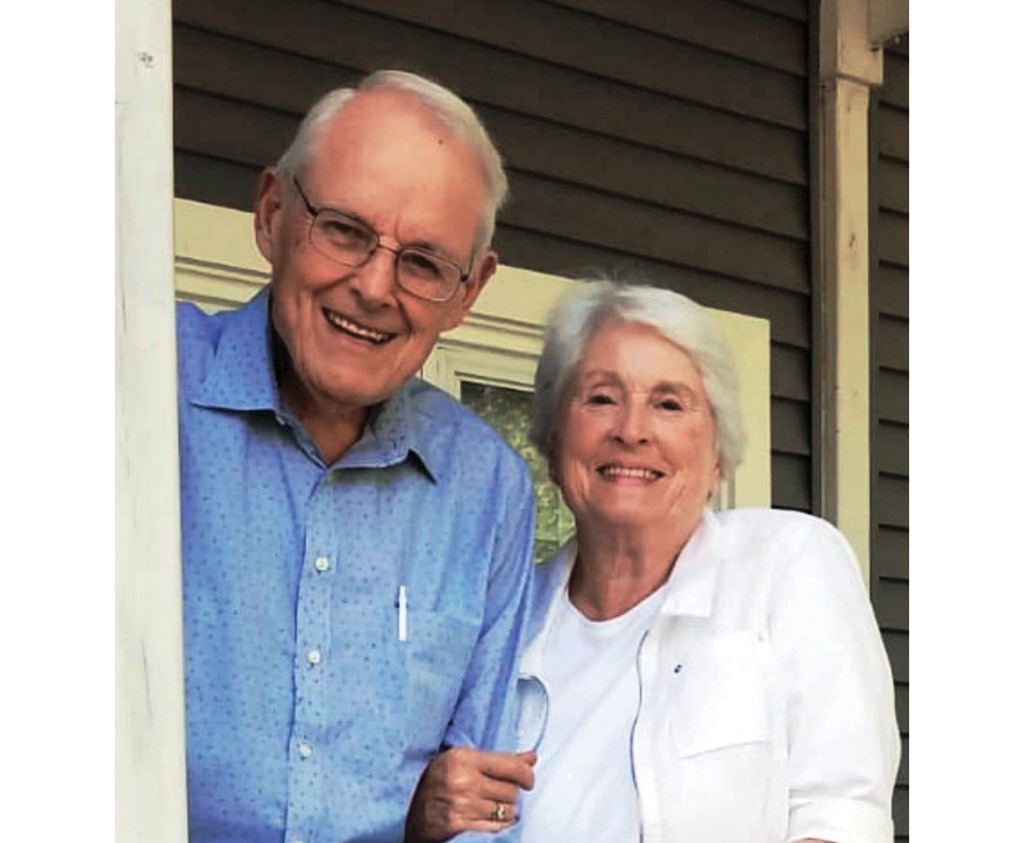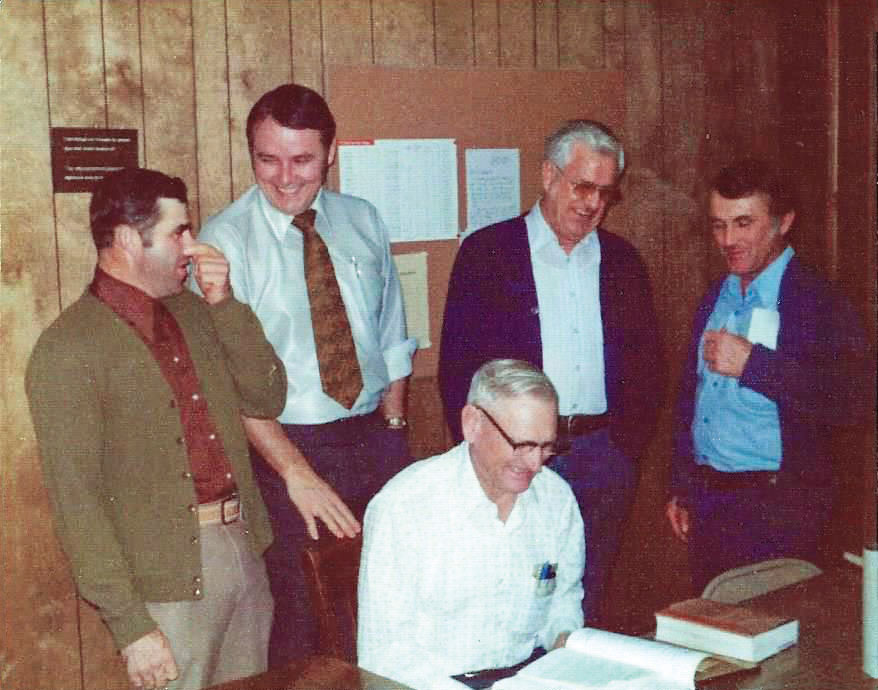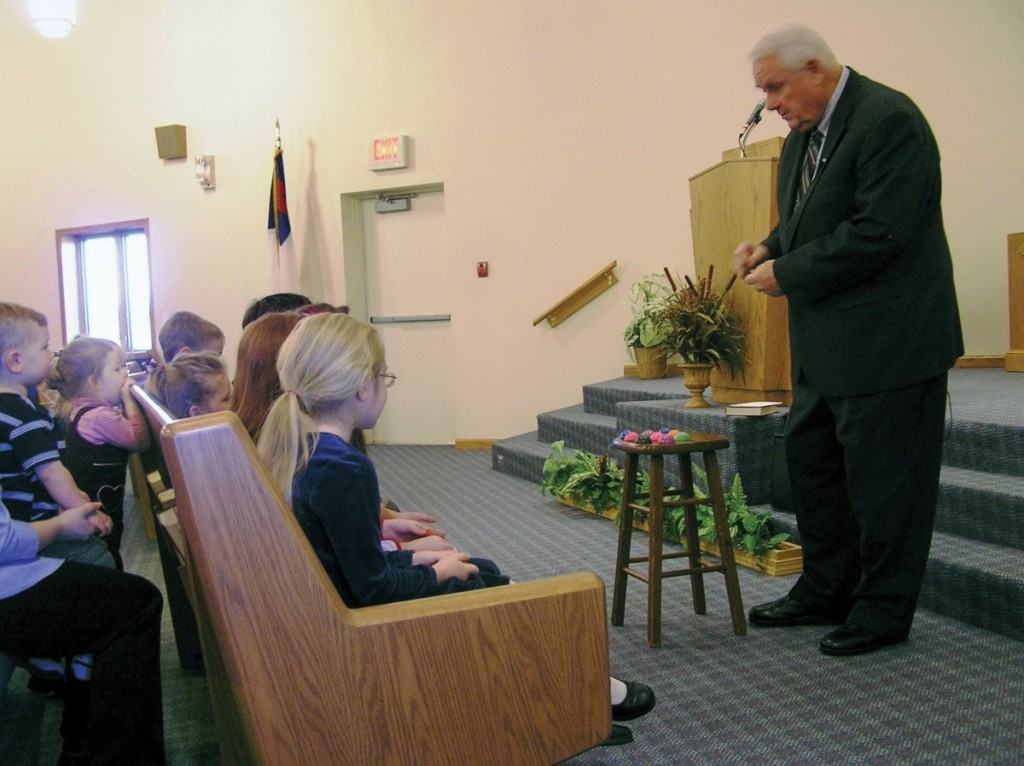In light of Rev. McFarland’s decades of experience as a church planter and pastor, the Witness asked to hear more about Bob’s life and ministry.
For you, what are some examples of how “the lines are fallen unto me in pleasant places; yea, I have a godly heritage” (Psalm 16:6)?
When I was two years old my father accepted the gospel call to Quinter, Kan. It was the early 1930s (sometimes called “The Dirty ’30s”). Dust storms rolled through western Kansas. Mother hung damp blankets over the windows to keep out the dust. But my two older brothers and I came away from those days blessed by the pleasant place where God placed us.
I saw as a boy the love and commitment to the Lord in many families. Because of crop failure and little finances, year after year cars came to church without doors—blankets were in their place.
I grew up before television, computers, and cell phones. I spent my time at church events: Monday night fun nights, Wednesday evening prayer meetings, regular congregational dinners, and softball games for all ages.
My heritage begins with Grandpa McFarland. His crippled shoemaker father had taught him to love the Lord and the Reformed Presbyterian Church. Grandpa McFarland, with only a fourth-grade education, daily led his nine children in family worship. Because of Grandpa’s faithful teaching, my father (A.J.) often mentioned that when he was a student at the Reformed Presbyterian Theological Seminary (RPTS) in Pittsburgh, he did not need to correct in his mind any doctrinal teachings from what his farmer father had taught him.
Another place where the lines fell in pleasant places was in the wife God gave me. Georgia also had a great spiritual heritage—generations of believing Christians and Reformed Presbyterian Church builders. Our 62 years of marriage have been a team ministry.
Looking back, what were some key times where you recognize that God put you in just the right situation to be used by Him?
God’s sovereign, eternal plan puts us in the right place and where He sees a need.
God placed me in summer jobs as a student. One was with Moltrop Steel in Beaver Falls, Pa. While there, God allowed me to have my unbelieving partner at work check me on Scripture memory. He also ate onions like an apple from his sack lunch! We worked the 4 p.m. to midnight shift.
God placed me on the Geneva College football team, where I observed my first personal conversion. Dave was a fellow team member. He turned from his sin to receive the forgiveness of Jesus Christ. Up to that time I had only heard of Chinese and Syrians turning from their sins.
After graduating from Geneva College and RPTS and completing graduate work at Indiana University, I was attending a meeting at Geneva. The president of Geneva at that time, Dr. Ed Clarke, called me into his office and asked if I would consider a teaching position at the college. I was greatly honored but explained that my graduate degree was to help me be a better pastor, not a professor. I explained that my education degree was meant to facilitate “tent-making” opportunities if I felt called to help plant new congregations. In a few years God placed me in a co-laboring role with Pastor Bob McMillan starting a new Reformed Presbyterian congregation in Park City (Wichita, Kan.).
To support my family during that time in the mid-’60s, God placed me on the teaching staff of a Wichita junior high school made up of 900 black students and 8 white students. I became identified as “the Christian Government teacher.” The assassination of President John F. Kennedy occurred during this time. This provided an opportunity to talk with the students on the meaning of death and being prepared.
After a few years of teaching and co-laboring in Wichita, I received a call to a rural congregation that wanted to learn outreach and elder leadership. I enjoyed being a full-time pastor again. When the local high school lost a history teacher, God put me on the Quinter High School staff. I taught as well as sponsored the early morning student prayer group. The Lord gave me the heart and friendship of Bud, the football coach, working as his assistant. He and his family of five joined the congregation, and he was elected an elder.
How did God put home missions on your heart?
I suppose it started with hearing about my grandfather’s experience of serving as a charter member of three Reformed Presbyterian congregations: Wahoo, Neb.; Billings, Okla.; and Orlando, Fla. He was a cattleman serving God who saw the importance of the church wherever his work took him.
Another very insightful experience that attracted me to home missions was the Covichord tour of 1957. It was a real, personal awakening. Our quartet was unified in our burden for the need of pastors and committed members in the RP Church. Several active pastors encouraged us and followed the guidance of Synod’s Christian education director, Ken Smith. We spoke in 28 congregations and four conferences, traveling 18,000 miles to speak and sing in new mission congregations: Hot Springs, N.M.; Phoenix, Ariz.; Los Angeles, Calif.; and Portland, Ore. I saw the opportunities and the need for gifted pastors at new works established by the Home Mission Board. Our quartet was always encouraged by seeing the old Blue Banner mounted on the walls of our new congregations.
Hearing mission reports from the Foreign Mission Board led me to investigate going to Japan to teach in the mission school attended by the children of our missionaries. When I was told they would only hire experienced teachers that had three years of teaching, my family moved to Wichita, where I taught for three years and served the new congregation there for part of that time.
During my 17-year pastorate in Quinter, Kan., the session sent me to Hays each Sabbath evening for several months to have a church-planting Bible study while the elders conducted the evening worship at Quinter. The Hays congregation was a new work that God prospered for 20 years.
I also offered to go to exchange pulpits in Northern Ireland. Some years later the opportunity came for a six-month exchange. These contacts also provided opportunities in retirement, and Georgia and I enjoyed a total of two years there. We usually served for three months at a time, doing so 10 different times.
Serving new works, at home and in foreign lands, was always a call I felt.
What particular counsel would you give to others interested in home missions and evangelism based on your experience?
Pray by name for new-work pastors and their families.
As a church member, seek out employment near a church plant or mission work.
As a young pastor, plan to worship for a few years in an active older congregation.
Seek internship opportunities. My pastoral internship experiences at Bloomington, Ind., RPC with Pastor Roy Blackwood, in Los Angeles with Pastor Paul Robb, and with pastor and seminary professor Ken Smith were a key factor in developing ministerial methods, and they continue to be a valuable source of counsel.
Remember to make sure the mature sheep of the congregation are growing and are healthy. Sheep produce lambs. Pray for strong covenant homes.
What do you see as the strengths of the RPCNA? How has the work with your congregations helped to pass these strengths on to the next generation?
To me one of the most visible strengths is what I call the “family strength.” Newcomers are amazed at the love for all generations. Wedding anniversaries celebrating 50 years, 60 years, 70 years of marriage! Our family conferences are unique among even other Reformed churches—1,500 to 2,000 or so people attend, with provisions for nursery children and with scooters for those with mobility challenges.
The psalms! Singing the psalms in worship, at conferences and retreats, around the campfire, and in family devotions. A pastor friend said, “Psalms are often accepted, but are loved as they sing their way into the hearts of people!” Scripture proofs and exegesis alone are only one reason for singing psalms in worship.
I still remember the first singing of “The Life of Christ in the Psalms” when I was in high school. We were at the Grinnell, Iowa, national family conference. We young people worked on singing skillfully and in harmony. My heart sensed the excitement of the beauty and theological soundness of the psalms we sang.
The development of youth summer ministry programs is a tool for passing biblical truth on to the younger generation. The old “Crusader School” where Remo Robb had organized all of us—who had ridden in with our folks or pastors to Synod—as “dishwashers for Synod.” He also arranged for Synod speakers to speak with us before they left. To us 25 to 30 young people in the basement of McCartney Library, this was a great time of learning. I heard my first personal testimony from an RP young person. This program developed into LTS and today’s programs such as Theological Foundations for Youth and Theological Foundations Backpacking trip.
We older servants of the church need to look for opportunities to help the youth and young couples in our congregations. I well remember the help of my father when his three grade school sons looked out on the front porch where our beloved dog was in a losing fight for his life with two greyhound dogs. Our yells for help reached Dad’s upstairs study. He raced to the rescue, baseball bat in hand. Greyhounds are no match for an angry preacher with his bat! The sight of two big dogs limping off of our front porch and leaving our helpless “Sport” caused cheers from the three sons—louder than when a winning touchdown is scored in the last play. One never forgets how an older person comes to their aid.
As I look back on my days of youth, I realize that I could tell a person who my elders were by name and even by the car that they drove to church. However, they took to their graves their personal experience of confessing sin and their testimony of coming to know Jesus Christ as a personal Savior and Lord in practical areas of their lives. They were not asked to talk about these things.
Over the years God has directed ministry as I prayed with and fellowshiped with the elders in my congregations. In Quinter, God gave His bride a group of godly men—they took seriously the Scripture verse that their congregation needed to “know them which labor among you, and are over you in the Lord” (1 Thess. 5:12 KJV). After I had used the 10- to 15-minute period in the worship service (sometimes called the psalm explanation time) to introduce myself spiritually to the congregation, the elders followed my example. Each in turn introduced their personal experience with the Lord and His church. Later on they each prepared a message: “The Profession of My Faith and How it Relates to My Profession.”
• Waldo McBurney spoke on bees, honey, and his profession as a beekeeper.
• Max Mann spoke on Noah’s ark, animals in the Bible, and his profession as a veterinarian.
• Chester Graham spoke on “consider the lilies” and his profession as a florist.
• Joe Copeland spoke on insurance—eternal assurance and his profession as an insurance adjuster.
For years the session met on Sabbath afternoons to do a Bible study. It knit us together as a team, because we knew each other in Christ. We prayed through each elder’s application, which they had written out to be shared.
The fruit of four elders’ testimonies and Christian walk before their own family is that five sons of these elders confessed their personal faith in Christ. They now serve as ordained officers in their congregations:
Personal time was essential to knit my heart to each elder. I remember often the experiences where I invited an elder to go with me to minister in other locations. Elder Max Mann and I set aside a full week to visit the Pacific Garden Rescue Mission in Chicago, Ill. There we participated in the evening call of Christ to broken, sinful lives. What a joy to pray from our fourth-floor dormitory for these persons who did not know Christ and to serve as counselor as they came to confess their sins.
What are some of the big lessons that you and Georgia have learned through trials?
Any harmony we have as a couple depends upon our remembering our oneness in Christ. We are daily thankful that we each tuned our lives to the same “tuning fork”—our Lord and Savior—before we promised to work in harmony and vowed to be wedded until death.
During the first three months of our marriage we were invited to be a seminary intern in Bloomington, Ind. Georgia had worked for the telephone company in East Liberty, Pa., during the year before our marriage. They promised her a transfer to the Bloomington office. After we had moved into our upstairs apartment and paid our rent, Georgia was told by the telephone company there was no job available. So I explained to Pastor Roy Blackwood our financial situation. He took me into his kitchen pantry, opened all of the doors, and said, “Bob and Georgia, half of this is yours!” Georgia found employment at the university the next week. It was a much better job situation because they closed during Christmas student holidays, so we too could visit our out-of-state families. God has provided all we needed these past 62 years.
You are known for your frequent use of stories and humor. How did your style develop, and how has it been helpful?
I have not given any thought to how you develop a sense of humor. I am convinced it must come naturally, and it must have a clarifying punch line. Christian humor must not be crude or immoral, but wholesome. It ought to be self-deprecating, as well.
I could listen to Sam Boyle, minister and missionary to China and Japan, lecture on the 10 commandments—which can get rather tiresome—but he had humor to go with each one. Each time, the joke summarized the point clearly or magnified the mistake of the commandment breaker.
When I became the pastor of the Topeka RP Church, the city of Topeka got an introduction to my humor on the front page of the Topeka Capital-Journal. I had been interviewed about New Year’s resolutions, and beside my photo and description as the “newly installed pastor of the Reformed Presbyterian Church” was my one resolution: “This year I plan to make new mistakes!” Of course, I had no idea the interviewer and TV cameras would catch the humor, but my congregation would see many new mistakes! How thankful I have been for a congregation that would love me through my new mistakes.
I am certain that Christ never had difficulty in holding people’s attention as He spoke. He would often stop with an illustration of “two boys on the farm” (the prodigal son) or losing money on the floor (the woman who looked for the lost coin). I remember promising God that I would not preach by rambling or by long quotations from scholars, but I would preach in shirtsleeve English. As a result, I have gotten responses and reactions as people greeted me at the door after the worship service. Early on in my ministry, one person commended me by saying, “You put the cookies on the lower shelf today where all of us could reach them.” (I’ll not mention the occasions when a member responded to my sermon by shouting at me at the door!)
When preaching on one of the points of worship and applying it—what is not commanded is forbidden—I used an illustration of the junior high school principal who commanded students to walk quietly between classes. At the break he found all of the students skipping and whistling as they went through the halls. Of course, the application is that when authority commands one thing, he is forbidding all other additions to worship. Sometimes it takes a little humor to help people see the point clearly.
Another kind of humor is self- deprecation. For instance, at Synod I have, on occasion, voted with the minority on issues. You might say I do so too often to please every member of Synod. One year the moderator invited all first-time members of Synod to come to the front. About 12 new men, plus pastors to introduce them, came forward. Two by two they received applause and went to their seats. I happened to be the last man standing with our delegate. I mentioned I was getting homesick already since I could recall several times I was the only one voting for some issue. A delegate shouted out, “What is that other guy standing there for?” (since I usually stood alone). Synod enjoyed a good laugh.
Conclusion
I think God uses many of us that are not the brightest scholars to preach the “foolishness” of the cross of Calvary. God sends out men who will make many mistakes each year.
On the wall in my study is a treasured plaque. It was given by the Topeka RP congregation upon my retirement from that congregation. It says:
To Bob and Georgia McFarland
With appreciation and love
For the twelve faithful years of service to the
Topeka Reformed Presbyterian Church
“For I resolved to know nothing while I was with you
Except Jesus Christ and Him crucified.”
1 Corinthians 2:2


